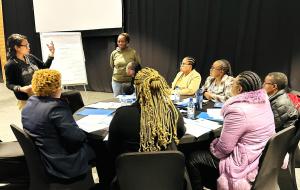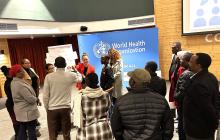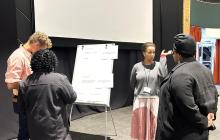Namibia’s Public Health Professionals Trained on Behavioral Insight
Behaviors are an essential part of our health and wellbeing. These include, among many others, drinking alcohol, smoking, being physically inactive, low vaccination uptake, overuse of antibiotics, and low adherence to treatment plans for diabetes and cardiovascular disease. Behaviors are complex and are affected by individual knowledge and motivation, as well as sociocultural and structural factors. Behavioral insight (BI) provides public health practitioners with an approach to tailor evidence-based interventions that draws on an understanding of these health behaviors and the context in which they take place, and on engaging with those affected. BI facilitates the changes needed to disrupt the negative impacts and promote positive behaviors with better health outcomes.
With funding from the Rockefeller Foundation (RKF), WHO recently facilitated a three-day workshop for the Ministry of Health and Social Services and teaching staff from the Faculty of Health Sciences and Veterinary Medicine of the University of Namibia (UNAM) in Swakopmund, Namibia. The workshop is part of an ongoing programme with WHO Namibia, WHO Regional office for Africa and WHO headquarters to strengthen the capacity of Ministry of Health and Social Services apply BI in health polices, services, and communication. Support is also being provided to the University of Namibia to develop a curriculum for a Post Graduate Diploma in Behavioral Insight that will then enable a longer-term workforce in the country with core knowledge and skills in BI and public health.
In delivering welcoming remarks on behalf of the Regional Health Director, Ms. Gezina Gomachas highlighted the workshop’s importance in fostering a deeper understanding of BI and its transformative potential. “This workshop is a testament to our collective commitment to harnessing the power of behavioral insights to drive tangible, sustainable change in public health policy and beyond” she emphasized. Ms. Gazina encouraged participants to engage actively, share insights and embark on the journey with a sense of purpose and determination. “May our collective efforts today bring us closer to our shared goals of achieving behavioral insights in Namibia” she added.
The participants engaged in a combination of knowledge-based modules and practical group sessions alternated between theoretical and hands-on learning. The knowledge-based modules introduced key behavioral sciences theories and frameworks to help participants understand public health issues and develop interventions to address behavioral barriers. The group sessions guided participants through steps and approaches for tackling public health issues from a behavioral perspective using scenario-based exercises. Participants were tasked to present practical examples within their groups to contextualize the concept for better understanding.
Facilitating the workshop, Dr. Karin Stein, a Technical Lead (Behavioral Insights) at WHO Headquarters expressed hope that participants would use the knowledge gained during the workshop to develop public health campaigns and interventions. “The workshop was rich in discussions and analysis, and I will be thrilled to get positive feedback on the incorporation of the BI in the development and implementation of public health interventions in the country” she added.
Pre- and post-session assessments were administered to evaluate the workshop’s success in achieving its goals. It was recommended that MHSS and its partners support the mainstreaming of BI in the country to improve the outcomes of interventions aimed at public health issues. “I appreciate the opportunity provided by WHO to participate in this enlightening workshop. It is now my duty to share the knowledge gained with my colleagues” said Mr. Pendapala Mhata, a Community Nurse at Eenhana Hospital.
MOHSS, WHO and UNAM will continue to collaborate and jointly draft a road map that will guide the implementation of BI in the country and ensure its application in public health.
A total of 37 professionals participated in the workshop.





